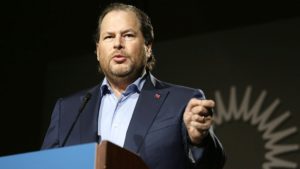Marc Benioff has spent the last 20 years building an iconoclastic company brand and a personal brand, and his unique approach toward engaging with the world was on full-power display at a recent technology-investors conference where he spoke not about cloud, ML and IoT but rather trust, values and culture.
Asked if the uneasiness many people feel about the onrush of AI and the rash of data-privacy disasters would lead to greater regulation of advanced technology, Benioff offered this blunt assessment to CEOs in every industry:
“For companies that won’t make that change, they’re just asking for it—they just can’t get outta their own way. It’s kinda crazy, actually,” he said with a slight chuckle. “It’s like, wow, you really can’t just say it, can you?
“All you have to say is, ‘Trust is our highest value, and we’re sorry for any mistake that we’ve made—forgive us.’ They cannot say it. They are just going in a completely different direction where they just keep fighting it. And by doing that, they destroy their brand. Their executives walk out of the company—you see it!”

In his appearance at the recent Goldman Sachs investors conference that featured presentations from high-level executives at many leading tech companies, Benioff chose to use his one-on-one fireside chat with Goldman CEO David Solomon to focus on new approaches to social and cultural issues that CEOs must take in today’s complex and fast-changing world.
What makes that approach particularly intriguing is that some leaders will look at Benioff’s agenda and say, He blew a big opportunity—instead of going on about all this touchy-feely stuff, he should have talked about his company’s new technologies, its 25% growth rate, its latest customer wins, its move into vertical markets.
But Benioff has never marched to the drummer that most others hear—recall that in Salesforce’s early days as an enterprise-software company, his slogan was “No Software!”—a red circle with the word “software” in the middle with a red slash through it. He was fully committed to the cloud while most other enterprise companies were trying to figure out what exactly the cloud was. He created new types of language to talk about technology in business, he framed old problems in new ways, and he always said exactly what he felt—an approach that ran sharply against the grain of the say-nothing-controversial business world.
(For a brilliant analysis of Benioff’s strategic approach toward category creation and massive differentiation, read the chapter about Benioff and Salesforce in Chris Lochhead’s superb book, Play Bigger.)
*******************
RECOMMENDED READING FROM CLOUD WARS:The World’s Top 5 Cloud-Computing Suppliers: #1 Microsoft, #2 Amazon, #3 Salesforce, #4 SAP, #5 IBM
Amazon Versus Oracle: The Battle for Cloud Database Leadership
As Amazon Battles with Retailers, Microsoft Leads Them into the Cloud
Why Microsoft Is #1 in the Cloud: 10 Key Insights
SAP’s Stunning Transformation: Qualtrics Already “Crown Jewel of Company”
Watch Out, Microsoft and Amazon: Google Cloud CEO Thomas Kurian Plans To Be #1
The Coming Hybrid Wave: Where Do Microsoft, IBM and Amazon Stand? (Part 1 of 2)
Oracle, SAP and Workday Driving Red-Hot Cloud ERP Growth Into 2019*********************
Here are a few particularly punchy samples of Benioff’s comments at the event, and you can watch the entire 27-minute video here.
- “CEOs need to wake up—they need to ask, ‘What kind of environment am I creating for my organization?’ ”
- “How do we treat women in our company? What are we doing to make our work environment in our company better for women? When I look at that, there are four areas: equal opportunity of course, equal advancement, but the brass tacks is equal pay: do you pay men and women equally for the same work? And for the vast majority of companies in the world, they don’t—the World Economic Forum said it’s going to be more than 100 years before we pay men and women equally.”
- “And the funny part is, we’ve bought 50 companies in the last decade or so, and when we buy companies and do due diligence, we now have to look at pay scales as part of due diligence! Five years ago, I did not look at pay scales in my due diligence—I did not look at culture, I didn’t look at GlassDoor ratings. Now I do—I have to look at those things because when you buy a company you’re not just buying the technology and the customers, you’re buying the culture.”
- “CEOs have to ask: what is really important to me right now? What is really important to me? Or how about this: what’s the most-important thing for your company? What’s your highest value? Is it integrity? Is it trust? Is it quality? Is it success? Is it innovation? What is the most important thing to you? And for each one of us, we will have a slightly different answer.”
- “We do that as CEOs—that’s our job, right? Once we get clear on what our values are—it could be trust, could be customer success, it could be innovation, it could be quality, it could be gratitude. When we look at the values in our company, we have to be able to say, ‘How are we going to operationalize those values? That’s our business plan.’ That’s what our employees are doing every day—they’re operationalizing our value—that’s the core of their work—so we have to be super-clear about what our values are because ultimately that is what our employees are going to be doing every single day.”
- “There’s two things in business: it’s not just what you’re doing, it’s HOW you’re doing it. And that is challenging to CEOs because the things we are talking about on this stage right here—a lot of the things we just went through—they’re not necessarily best practices or well-established programs or classes, and this is not what we learned when I went to business school from 1982 to 1986 at USC at the Marshall School. That is not what we learned—there was no gender-equality class, okay? It did not exist. We are learning on the fly, and that’s why we need to learn and grow together. The role of the CEO has changed—and for CEOs who actually understand that, their performance has improved. For CEOs who do NOT understand that, they’re struggling.”
Benioff ended the interview with some comments about how he decided it was essential for him to promote former COO Keith Block to the position of co-CEO to allow Benioff to continue to pursue some of these initiatives whole-heartedly without fast-growing Salesforce skipping a beat.
“But there’s always another way because there’s infinite possibilities—and when it comes to things like the vision for our company or our values, for who we are and what we’re doing, our individual roles in these organizations—there’s always another way. There’s always another option, and the key is how do you find that next way.”
Again, you can see the whole video here.
Subscribe to the Cloud Wars Newsletter for twice-monthly in-depth analysis of the major cloud vendors from the perspective of business customers. It’s free, it’s exclusive, and it’s great!








